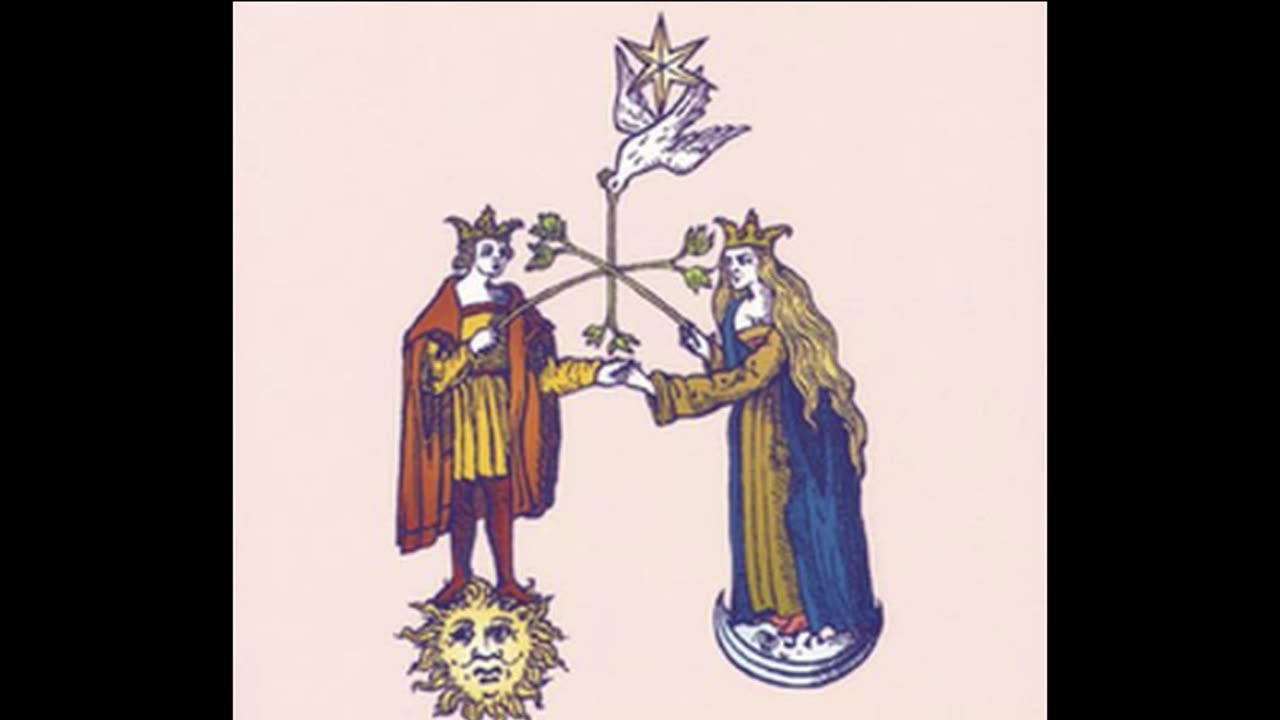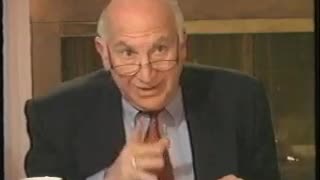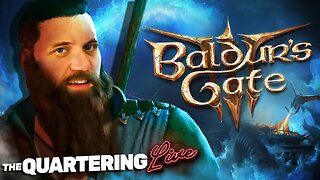Premium Only Content

The Chymical Wedding of Christian Rosenkreutz by: Johann Valentin (1616)
The Chymical Wedding of Christian Rosenkreutz was originally published anonymously in Strasbourg in 1616. Like the earlier Rosicrucian manifestos, its anonymous nature added to the mystique surrounding the Rosicrucian order. The work was widely circulated among intellectual and esoteric circles in Europe, fueling speculation about the existence of the mysterious "Fraternity of the Rose Cross."
Scholars have since attributed the work to Johann Valentin Andreae, based on stylistic and thematic similarities to his other writings, particularly his utopian novel Christianopolis (1619). Additionally, in his later years, Andreae hinted that his early involvement with Rosicrucian literature was somewhat satirical, referring to some of these works as "ludibrium" (a jest). Despite this, the depth of alchemical and spiritual knowledge in The Chymical Wedding suggests a more complex intent, blending allegory, esoteric symbolism, and spiritual philosophy. Many scholars believe that Andreae’s later distancing from the Rosicrucian movement was part of his attempt to focus more on his theological career.
The Chymical Wedding of Christian Rosenkreutz is the third and most enigmatic of the original Rosicrucian manifestos. Unlike the Fama Fraternitatis and Confessio Fraternitatis, which were more straightforward calls for spiritual reform and esoteric knowledge, The Chymical Wedding is presented as an allegorical narrative filled with alchemical symbolism, dreamlike sequences, and mystical themes. The work is considered a seminal text in esoteric and alchemical literature, representing the spiritual journey of Christian Rosenkreutz, the mythical founder of the Rosicrucian fraternity.
The story begins when Christian Rosenkreutz receives a mysterious invitation to attend a royal wedding at a distant castle. The invitation, which appears under strange circumstances, invites him to partake in a seven-day spiritual and alchemical journey that takes place during the wedding.
As the narrative unfolds, Rosenkreutz embarks on a symbolic quest that tests his moral character, spiritual insight, and alchemical knowledge. The tale is divided into seven days, each marked by distinct challenges and alchemical processes, mirroring the stages of the alchemical Great Work (Magnum Opus) that transforms base matter into gold—a metaphor for spiritual enlightenment.
During the seven days, Rosenkreutz witnesses strange and magical occurrences, including the dismemberment and resurrection of the king and queen, various alchemical experiments, and interactions with mystical characters. These events are imbued with profound symbolism that reflects the transformative journey of the soul towards divine knowledge, echoing both Christian and Hermetic traditions.
The wedding itself is symbolic of the alchemical marriage (coniunctio), a key concept in alchemical philosophy, representing the union of opposites (sulfur and mercury, male and female, spirit and matter). This union symbolizes the ultimate goal of the alchemist: to transmute the base aspects of human nature into spiritual gold.
Rosenkreutz’s journey is also a spiritual quest, filled with tests of his virtue, intellect, and faith. His experiences reflect the process of purifying the soul, shedding earthly attachments, and achieving mystical union with the divine.
The text subtly presents the ideals of the Rosicrucian order—hidden wisdom, self-improvement, and service to humanity. While the Rosicrucians are known for their secrecy, The Chymical Wedding promotes the idea of inner transformation as a means to contribute to the greater good, much like the spiritual goals described in earlier Rosicrucian manifestos.
The narrative weaves Christian mysticism with Hermetic and alchemical teachings. The symbolism of death, resurrection, and the sacred marriage align with Christian allegories of salvation, while also drawing on Hermetic ideas about the unity of all things and the divine nature of human potential.
The Chymical Wedding is often interpreted as both an allegorical dream and a practical guide to spiritual transformation. Its complex, symbolic imagery reflects a synthesis of alchemical, mystical, and Christian ideas. Johann Valentin Andreae, the likely author, had deep knowledge of the esoteric traditions circulating in early 17th-century Europe, and the work is steeped in the intellectual currents of its time, including the Hermetic revival, alchemical practices, and the secret societies emerging in Europe.
The work is also significant for its influence on later esoteric traditions, including Freemasonry and modern occult movements. It is considered one of the foundational texts of Rosicrucianism, an esoteric movement that combined mysticism, alchemy, and the pursuit of hidden knowledge. The story’s emphasis on the transformative power of knowledge, the sacredness of the inner journey, and the concept of hidden wisdom echoes throughout later mystical and occult writings.
About the Author:
Johann Valentin Andreae (1586–1654) was a German theologian, philosopher, and writer. He is best known for his association with the Rosicrucian movement, particularly through his connection to the three key Rosicrucian manifestos: the Fama Fraternitatis, Confessio Fraternitatis, and The Chymical Wedding of Christian Rosenkreutz. Though Andreae later distanced himself from the Rosicrucian movement, referring to it as a “ludibrium” (a joke or plaything), many scholars believe that he authored The Chymical Wedding as an allegorical work, blending his interest in mystical, theological, and philosophical ideas.
Andreae studied theology at the University of Tübingen, where he was exposed to various currents of Renaissance humanism, science, and esotericism. His background in Christian mysticism and Hermetic philosophy shaped his approach to writing and his views on spiritual reform.
Although Andreae denied involvement in the creation of a real Rosicrucian brotherhood, his works—particularly The Chymical Wedding—are deeply linked to Rosicrucian ideals of spiritual enlightenment, alchemical transformation, and the pursuit of secret knowledge. His other notable work, Christianopolis, further explores utopian ideas of a society governed by wisdom and spiritual principles.
Andreae was deeply committed to Christian reform and spent much of his life advocating for a revival of Christian piety and learning. He served as a Lutheran pastor and theologian, and many of his writings reflect his vision of a world transformed by knowledge, virtue, and spiritual dedication.
Despite his later denial of active involvement in the Rosicrucian movement, Andreae's works, including The Chymical Wedding, have left an enduring legacy in Western esotericism. The text has been influential not only in the development of Rosicrucian thought but also in shaping the broader Western esoteric tradition, influencing later movements such as Freemasonry and various occult societies.
-
 1:57:40
1:57:40
Deus Meum Que Jus
26 days agoIrwin Schiffs Secrets of Living an Income Tax-Free Life Part 1
368 -
 4:34:26
4:34:26
Akademiks
5 hours agoICEMAN EPISODE 3
128K -
 2:04:10
2:04:10
Inverted World Live
7 hours agoThe Robots Are Here | Ep. 103
58.4K13 -
 1:21:53
1:21:53
Man in America
15 hours agoInflation, Debt & War: The 2032 Crash Cycle Is Here—Nations Will FALL w/ Martin Armstrong
50.6K19 -
 1:53:48
1:53:48
Adam Does Movies
14 hours ago $2.37 earnedTalking Movies + Ask Me Anything - LIVE
20.7K2 -
 2:55:43
2:55:43
TimcastIRL
6 hours agoTrump DOJ To Ban Trans People From Owning Guns After Catholic School Shooting | Timcast IRL
181K105 -
 3:21:36
3:21:36
The Quartering
6 hours agoBaldur's Gate 3 First Playthrough!
41.6K6 -
 6:34:42
6:34:42
Rallied
8 hours ago $7.39 earnedWarzone Solo Challenges
76.1K2 -
 57:40
57:40
MattMorseTV
7 hours ago $10.91 earned🔴Trump just SHATTERED the RECORD.🔴
54.2K90 -
 43:39
43:39
WickedVirtue
5 hours agoLate Night Spooky Plays
29.9K2